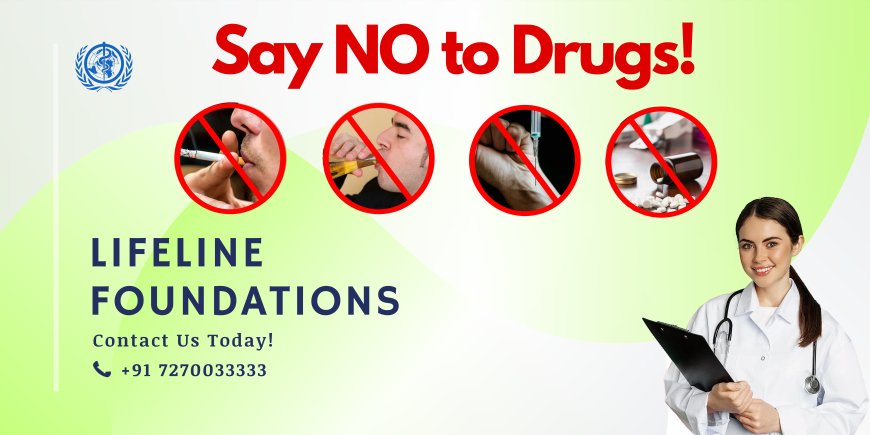Effectiveness of Nasha Mukti Kendra in Punjab: Success Stories and Challenges
Nasha Mukti Kendra In Punjab has been established across the state to address this crisis. These centers aim to provide treatment, support, and rehabilitation to individuals struggling with substance abuse. This essay explores the effectiveness of Nasha Mukti Kendras in Punjab by examining success stories and the challenges they face.

The rising prevalence of substance abuse in Punjab has posed significant challenges to public health and societal well-being. In response, Nasha Mukti Kendra in Punjab have been established across the state to address this crisis. These centers aim to provide support and treatment for individuals struggling with addiction, helping them to reclaim their lives and reintegrate into society. This essay explores the effectiveness of Nasha Mukti Kendras in Punjab, highlighting their success stories and the challenges they face.
Success Stories of Nasha Mukti Kendras in Punjab
-
Transformative Impact on Individuals
Several Nasha Mukti Kendra in Punjab have demonstrated significant success in transforming the lives of their clients. Success stories often involve individuals who, after completing their rehabilitation program, have gone on to lead productive, fulfilling lives. For example, the Sahara Nasha Mukti Kendra in Amritsar has been praised for its holistic approach, which combines medical treatment with psychological counseling and vocational training. Many former clients of Sahara Kendra have successfully reintegrated into society, finding employment and rebuilding relationships with their families.
-
Community Outreach and Prevention Programs
Some Nasha Mukti Kendras are also making a positive impact through their community outreach and prevention programs. Nasha Mukti Kendra in Punjab, for instance, conducts educational workshops and awareness campaigns in local schools and communities to prevent substance abuse. These programs have been instrumental in reducing the incidence of drug abuse among youth in the area. By addressing the issue before it escalates, Roshni Kendra has contributed to the overall effectiveness of the state’s drug rehabilitation efforts.
-
Successful Integration of Traditional and Modern Therapies
The effectiveness of Nasha Mukti Kendras is also evident in their use of a combination of traditional and modern therapeutic methods. For instance, the Mann Nasha Mukti Kendra in Ludhiana integrates Ayurvedic treatments with contemporary medical practices. This approach has resonated well with patients who prefer a blend of holistic and scientific treatments. The success of such integrated methods showcases the adaptability of Nasha Mukti Kendras in catering to diverse needs.
Challenges Faced by Nasha Mukti Kendras in Punjab
-
Resource Constraints
One of the major challenges faced by Nasha Mukti Kendras is the lack of adequate resources. Many centers struggle with limited funding, which affects their ability to provide comprehensive treatment programs. For example, smaller centers in rural areas often lack the facilities and trained personnel required for effective rehabilitation. This resource constraint hampers their ability to offer a full spectrum of services, including medical care, counseling, and vocational training.
-
Stigma and Social Barriers
The stigma associated with drug addiction and rehabilitation remains a significant barrier to the effectiveness of Nasha Mukti Kendras. Many individuals and families hesitate to seek help due to fear of social judgment. This reluctance can delay treatment and exacerbate the problem. Nasha Mukti Kendras often need to work on changing societal attitudes towards addiction and treatment to encourage more people to come forward for help.
-
Inconsistent Quality of Services
The quality of services provided by Nasha Mukti Kendras can vary widely, with some centers offering high-quality, evidence-based treatment, while others may provide substandard care. This inconsistency can affect the overall success rate of rehabilitation efforts in the state. Ensuring uniform standards of care across all centers is essential for improving effectiveness and achieving better outcomes for individuals seeking help.
-
Limited Aftercare Support
Another challenge is the lack of adequate aftercare support for individuals who have completed their rehabilitation programs. Effective drug rehabilitation is not just about treatment but also about providing ongoing support to prevent relapse. Many Nasha Mukti Kendras in Punjab do not have robust aftercare programs, which can lead to high rates of relapse among former clients. Developing comprehensive aftercare services, including counseling, support groups, and job placement assistance, is crucial for sustaining long-term recovery.
-
Lack of Coordinated Efforts
The effectiveness of Nasha Mukti Kendras is sometimes hindered by a lack of coordination between different stakeholders, including government agencies, non-governmental organizations, and local communities. A more coordinated approach involving all relevant parties could enhance the overall impact of drug rehabilitation efforts. Improved collaboration can lead to better resource allocation, more effective programs, and a stronger support network for individuals in recovery.
Conclusion
Nasha Mukti Kendras in Punjab play a vital role in addressing the issue of substance abuse and providing support to individuals seeking to overcome addiction. While many centers have achieved notable success, their effectiveness is tempered by various challenges, including resource constraints, stigma, inconsistent service quality, and inadequate aftercare. Addressing these challenges through improved funding, social awareness, quality standards, and coordinated efforts can enhance the overall impact of Nasha Mukti Kendras and contribute to a more effective response to the drug addiction crisis in Punjab. By building on their successes and addressing their shortcomings, these centers can continue to make a significant difference in the lives of those struggling with addiction.
What's Your Reaction?
 Like
0
Like
0
 Dislike
0
Dislike
0
 Love
0
Love
0
 Funny
0
Funny
0
 Angry
0
Angry
0
 Sad
0
Sad
0
 Wow
0
Wow
0




















































